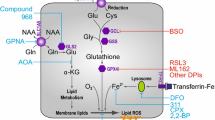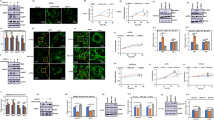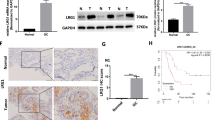Abstract
We examined the biological effects of nitric oxide (NO) and its mediator, heme oxygenase-1 (HO-1), in cancer. Urogenital cancer cell lines, SKRC, T24 and DU145, were treated with various concentrations of sodium nitroprusside (SNP), a NO donor. The medium nitrite concentration was exponentially increased according to the concentration of SNP. Cell growth inhibition by NO was observed only at high nitrite concentrations (>20 μM) in DU145 and T24 cells. Nitrite did not inhibit the growth of SKRC cells at any of the concentrations used. Doxorubicin (DXR) inhibited cell growth in the three cell lines, whereas growth inhibition recovered in the presence of <10 μM nitrite. The recovery of DXR-induced growth inhibition was closely associated with an increase in Bcl-2 in the presence of <10 μM nitrite. Vascular endothelial growth factor (VEGF) secretion was also increased in the presence of <10 and <20 μM nitrite, respectively, in DU145 and SKRC or T24 cells. The expression of HO-1 was associated with sensitivity to NO-induced growth inhibition at constitutive levels, and was induced by SNP treatment. HO-1 inhibition by HO-1 antisense S-oligodeoxynucleotide treatment increased NO-induced growth inhibition, and decreased Bcl-2 expression or VEGF secretion in the three cell lines. These findings suggest that the NO/HO-1 system has protumoral effects.


Similar content being viewed by others
Abbreviations
- DXR:
-
Doxorubicin
- ELISA:
-
Enzyme-linked immunosorbent assay
- HO:
-
Heme oxygenase
- NO:
-
Nitric oxide
- S-ODN:
-
18-Mer S-oligodeoxynucleotide
- SNP:
-
Sodium nitroprusside
- TAMs:
-
Tumor-associated macrophages
- VEGF:
-
Vascular endothelial growth factor
References
Ambs S, Merriam WG, Ogunfusika MO, Bennett WP, Ishibe N, Hussain SP, Tzeng EE, Geller DA, Billiar TR, Harris CC (1998) p53 and vascular endothelial growth factor regulate tumor growth of NOS2-expressing human carcinoma cells. Nat Med 4:1371–1376
Brouard S, Otterbein LE, Anrather J, Tobiasch E, Bach FH, Choi AM, Soares MP (2000) Carbon monoxide generated by heme oxygenase 1 suppresses endothelial cell apoptosis. J Exp Med 192:1015–1026
Bussolati B, Ahmed A, Pemberton H, Landis RC, Di Carlo F, Haskard DO, Mason JC (2004) Bifunctional role for VEGF-induced heme oxygenase-1 in vivo: induction of angiogenesis and inhibition of leukocytic infiltration. Blood 103:761–766
Cemazar M, Grosel A, Glavac D, Kotnik V, Skobrne M, Kranjc S, Mir LM, Andre F, Opolon P, Sersa G (2003) Effects of electrogenetherapy with p53wt combined with cisplatin on survival of human tumor cell lines with different p53 status. DNA Cell Biol 22:765–775
Coito AJ, Buelow R, Shen XD, Amersi F, Moore C, Volk HD, Busuttil RW, Kupiec-Weglinski JW (2002) Heme oxygenase-1 gene transfer inhibits inducible nitric oxide synthase expression and protects genetically fat Zucker rat livers from ischemia-reperfusion injury. Transplantation 74:96–102
Demple B (2004) Protection from the dark side of NO: signaling and cellular defenses against nitric oxide toxicity. IUBMB Life 56:59–64
Dinapoli MR, Calderon CL, Lopez DM (1996) The altered tumoricidal capacity of macrophages isolated from tumor-bearing mice is related to reduce expression of the inducible nitric oxide synthase gene. J Exp Med 183:1323–1329
Dulak J, Loboda A, Zagorska A, Jozkowicz A (2004) Complex role of heme oxygenase-1 in angiogenesis. Antioxid Redox Signal 6:858–866
Dulak J, Jozkowicz A, Foresti R, Kasza A, Frick M, Huk I, Green CJ, Pachinger O, Weidinger F, Motterlini R (2002) Heme oxygenase activity modulates vascular endothelial growth factor synthesis in vascular smooth muscle cells. Antioxid Redox Signal 4:229–240
Forstermann U, Mugge A, Alheid U, Haverich A, Frolich JC (1988) Selective attenuation of endothelium-mediated vasodilation in atherosclerotic human coronary arteries. Circ Res 62:185–190
Hara E, Takahashi K, Tominaga T, Kumabe T, Kayama T, Suzuki H, Fujita H, Yoshimoto T, Shirato K, Shibahara S (1996) Expression of heme oxygenase and inducible nitric oxide synthase mRNA in human brain tumors. Biochem Biophys Res Commun 224:153–158
Hibbs JBJ, Vavrin Z, Taintor RR (1987) L-arginine is required for expression of the activated macrophage effector mechanism causing selective metabolic inhibition in target cells. J Immunol 138:550–565
Hinata N, Shirakawa T, Zhang Z, Matsumoto A, Fujisawa M, Okada H, Kamidono S, Gotoh A (2003) Radiation induces p53-dependent cell apoptosis in bladder cancer cells with wild-type-p53 but not in p53-mutated bladder cancer cells. Urol Res 31:387–396
Honing ML, Morrison PJ, Banga JD, Stroes ES, Rabelink TJ (1998) Nitric oxide availability in diabetes mellitus. Diabetes Metab Rev 14:241–249
Ishikawa T, Yoshida N, Higashihara H, Inoue M, Uchiyama K, Takagi T, Handa O, Kokura S, Naito Y, Okanoue T, Yoshikawa T (2003) Different effects of constitutive nitric oxide synthase and heme oxygenase on pulmonary or liver metastasis of colon cancer in mice. Clin Exp Metastasis 20:445–450
Jenkins DC, Charles IG, Thomsen LL, Moss DW, Holmes LS, Baylis SA, Rhodes P, Westmore K, Emson PC, Moncada S (1995) Roles of nitric oxide in tumor growth. Proc Natl Acad Sci U S A 92:4392–4396
Katori M, Buelow R, Ke B, Ma J, Coito AJ, Iyer S, Southard D, Busuttil RW, Kupiec-Weglinski JW (2002) Heme oxygenase-1 overexpression protects rat hearts from cold ischemia/reperfusion injury via an antiapoptotic pathway. Transplantation 73:287–292
Kim YM, Kim TH, Seol DW, Talanian RV, Billiar TR (1998) Nitric oxide suppression of apoptosis occurs in association with an inhibition of Bcl-2 cleavage and cytochrome c release. J Biol Chem 273:31437–31441
Kimura H, Esumi H (2003) Reciprocal regulation between nitric oxide and vascular endothelial growth factor in angiogenesis. Acta Biochim Pol 50:49–59
Kuniyasu H, Yasui W, Kitahara K, Naka K, Yokozaki H, Akama Y, Hamamoto T, Tahara H, Tahara E (1997) Growth inhibitory effect of interferon-beta is associated with the induction of cyclin-dependent kinase inhibitor p27Kip1 in a human gastric carcinoma cell line. Cell Growth Differ 8:47–52
McGowan AJ, Fernandes RS, Samali A, Cotter TG (1996) Anti-oxidants and apoptosis. Biochem Soc Trans 24:229–233
Minor RLJ, Myers PR, Guerra RJ, Bates JN, Harrison DG (1990) Diet-induced atherosclerosis increases the release of nitrogen oxides from rabbit aorta. J Clin Invest 86:2109–2116
Palmer RM, Ferrige AG, Moncada S (1987) Nitric oxide release accounts for the biological activity of endothelium-derived relaxing factor. Nature 327:524–526
Shrivastava P, Singh SM, Singh N (2003) Effect of thymosin-alpha1 on the production of nitric oxide by tumor-associated macrophages. Neoplasma 50:47–53
Sikorski EM, Hock T, Hill-Kapturczak N, Agarwal A (2004) The story so far: molecular regulation of the heme oxygenase-1 gene in renal injury. Am J Physiol Renal Physiol 286:F425–F441
Takahashi K, Hara E, Suzuki H, Sasano H, Shibahara S (1996) Expression of heme oxygenase isozyme mRNAs in the human brain and induction of heme oxygenase-1 by nitric oxide donors. J Neurochem 67:482–489
Tozer GM, Prise VE, Motterlini R, Poole BA, Wilson J, Chaplin DJ (1998) The comparative effects of the NOS inhibitor, Nw-nitro-L-arginine, and the haemoxygenase inhibitor, zinc protoporphyrin IX, on tumour blood flow. Int J Radiat Oncol Biol Phys 42:849–853
Williams SB, Cusco JA, Roddy MA, Johnstone MT, Creager MA (1996) Impaired nitric oxide-mediated vasodilation in patients with non-insulin-dependent diabetes mellitus. J Am Coll Cardiol 27:567–574
Xu W, Liu L, Smith GC, Charles G (2000) Nitric oxide upregulates expression of DNA-PKcs to protect cells from DNA-damaging anti-tumour agents. Nat Cell Biol 2:339–345
Xu W, Liu LZ, Loizidou M, Ahmed M, Charles IG (2002) The role of nitric oxide in cancer. Cell Res 12:311–320
Acknowledgements
We thank Miss Kaori Obara for excellent assistance in preparing the manuscript.
Author information
Authors and Affiliations
Corresponding author
Additional information
This work was supported by a Grant-in-Aid for Scientific Research (B) from the Japan Society for the Promotion of Science (KAKENHI: 15390130).
Rights and permissions
About this article
Cite this article
Sasaki, T., Yoshida, K., Kondo, H. et al. Heme oxygenase-1 accelerates protumoral effects of nitric oxide in cancer cells. Virchows Arch 446, 525–531 (2005). https://doi.org/10.1007/s00428-005-1247-x
Received:
Accepted:
Published:
Issue Date:
DOI: https://doi.org/10.1007/s00428-005-1247-x




